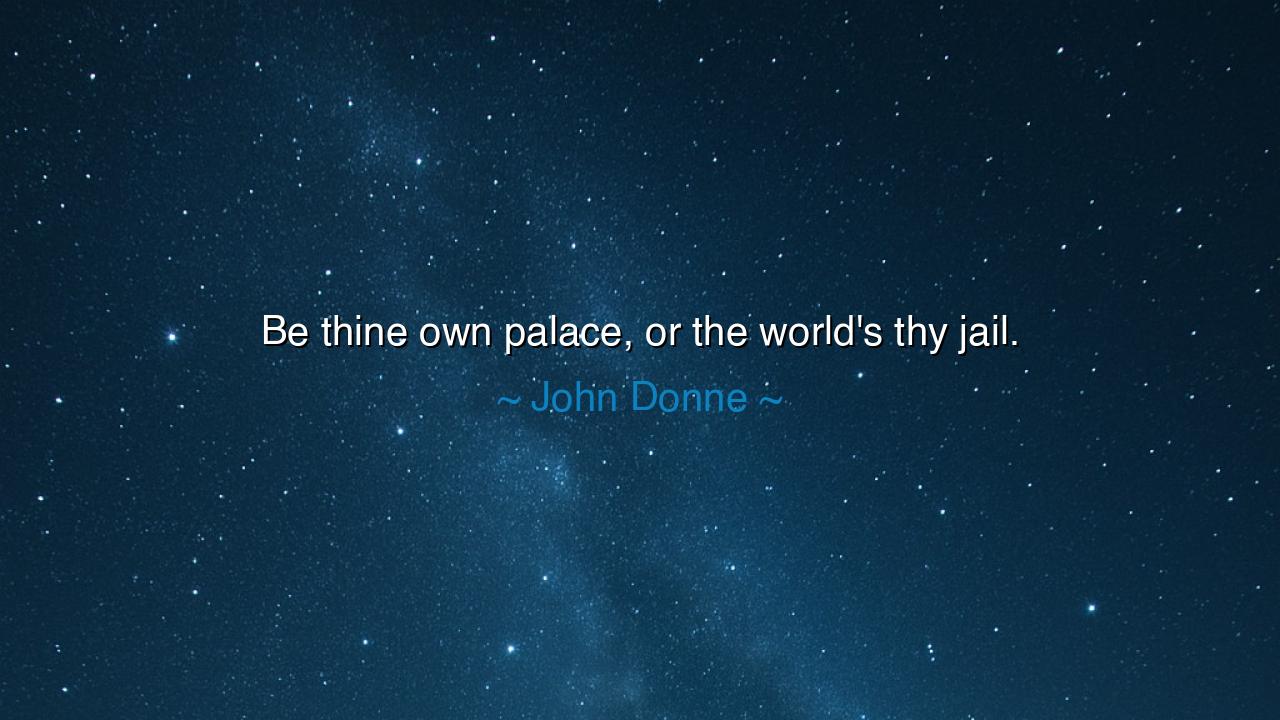
Be thine own palace, or the world's thy jail.






Attend, O child of wisdom, to the words of John Donne, that fiery soul of the seventeenth century, who declared: “Be thine own palace, or the world’s thy jail.” With this utterance he revealed a truth that is both bitter and radiant: the freedom of man lies not in the outward things of stone or crown, but within the dominion of his own mind. For if a soul does not learn to build within itself a place of strength, of order, and of peace, then the vast world around it becomes a prison, pressing upon it with chains of fear and sorrow.
To be thine own palace is to cultivate an inner kingdom. It is to adorn the chambers of the heart with wisdom, to guard the gates of thought with discipline, and to furnish the soul with contentment. When a man has done this, he carries freedom wherever he walks. Whether he wanders in wilderness or dwells in poverty, he remains sovereign, for no force of circumstance can overthrow the citadel he has built within. But the one who neglects this labor finds himself in bondage; for without inner mastery, even the fairest delights of the world become torment, and every corridor of life a dungeon.
Behold the example of Nelson Mandela. Cast into Robben Island’s prison, his body was confined, yet his spirit was vast as the heavens. Where others saw walls, he saw the testing ground of the soul. He adorned his prison with patience, with study, with hope, until at last the jail became his workshop, shaping him into the leader who would break the chains of a nation. Mandela was his own palace, and thus no worldly jail could bind him. His life stands as living testimony to Donne’s truth: that the true bars of prison are forged not of iron, but of a mind left unguarded.
Yet contrast this with the fate of emperors and kings who, though seated on golden thrones, were captives of their own unrest. They possessed lands, treasures, armies—yet could not govern themselves. Their palaces were filled with splendor, but their hearts were barren. And so the world, though wide, became a jail to them, for the unrest of the inner man turns even paradise into prison. Thus it is proven: wealth cannot purchase freedom, nor power secure peace, unless the soul has made itself strong.
The teaching resounds: do not be deceived by the illusion that liberty lies in external abundance. Liberty is the mastery of the self, the choosing of virtue over vice, of calm over chaos. When you discipline your desires, train your thoughts, and cultivate gratitude, you are building halls of freedom within you. Then no storm without can shake your walls, no enemy can breach your fortress. The palace of the self endures where kingdoms fall and empires crumble.
Therefore, O listener, take up this noble labor. Each day, lay a stone in the building of your inner palace. Through meditation, strengthen the foundations. Through learning, carve the pillars. Through kindness, adorn the halls. Let self-respect be your crown, and contentment your throne. Then you shall never be homeless, never a prisoner, for you carry your dwelling in the very core of your being.
And let this be your lesson: if you do not rule yourself, the world shall rule you. If you do not build within, you will be crushed without. The palace or the jail—this is the choice before every soul. Choose, then, to be your own palace, and walk as one who is free in every land, master of himself, sovereign even when stripped of all else. For the world cannot imprison the one who has made a kingdom within.






AAdministratorAdministrator
Welcome, honored guests. Please leave a comment, we will respond soon